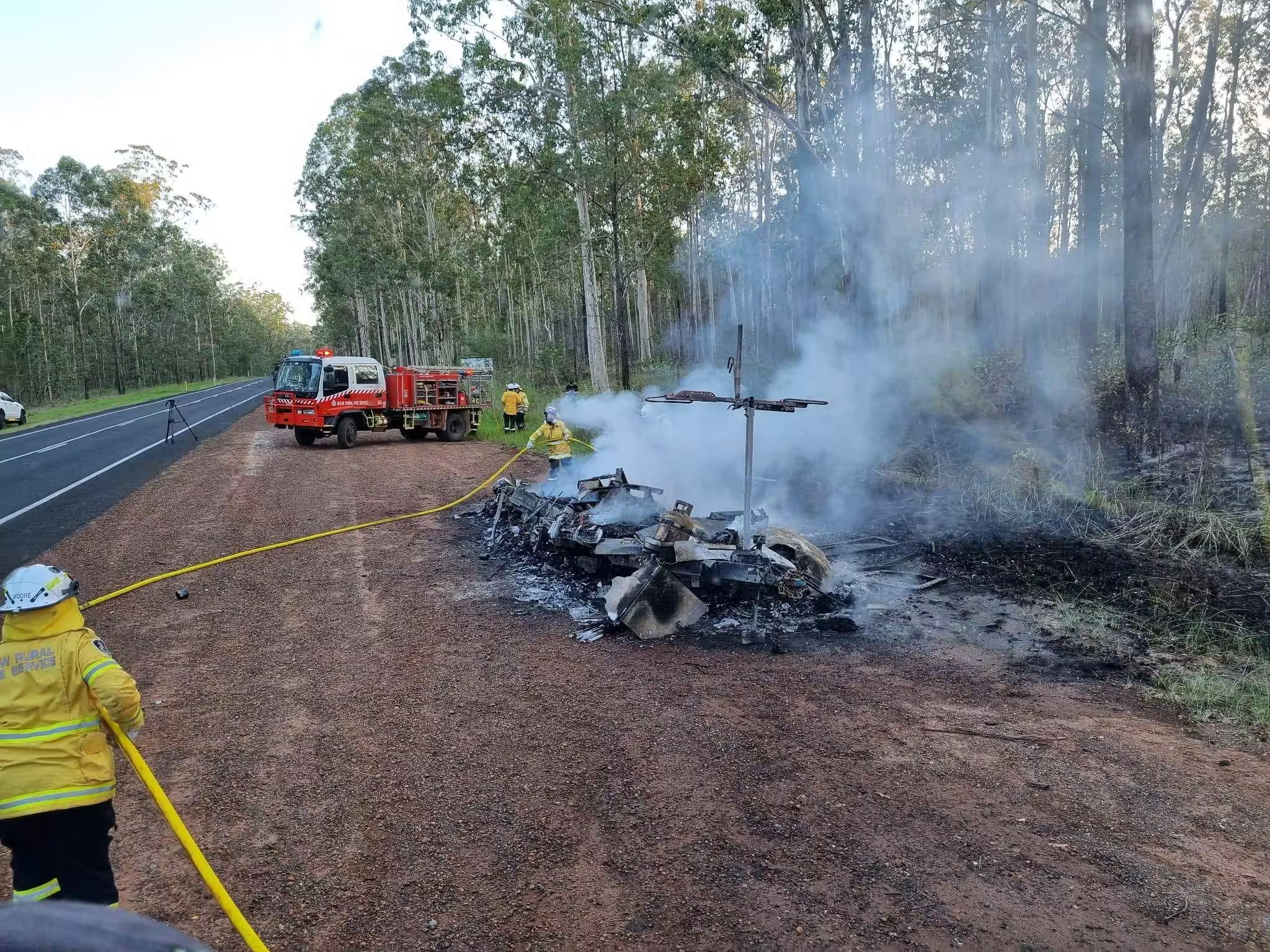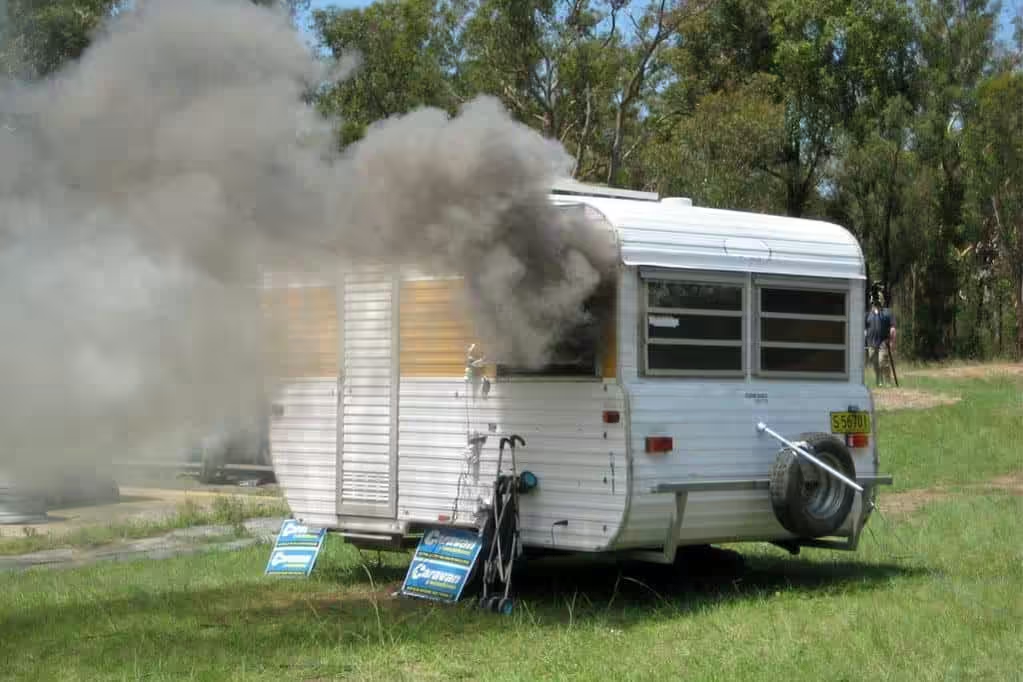How to fire-safe your RV




Let’s be real here. You didn’t buy your camper/caravan/motorhome with big plans of ducking down to the local campgrounds. There are endless expanses of deserts to explore. 34,000 kilometres of uninterrupted coastline calling your name. And that’s not even talking about just how stunning some of the hinterland is, accessible hours down unnamed dirt roads. Yep, getting away from it all might just have overtaken the suburban house and white picket fence as the all-Aussie dream.
The problem is, getting away from it all can also mean getting away from vital services, like the fire brigade. If your toaster goes up in the ‘burbs you can typically assume there’ll be a big red truck at your front door within 5-10 minutes. Out past the black stump? It could be 5-10 hours. So, what can you do to not only minimise the risk of fire in your RV, but ensure you’re primed to handle it if it does happen? We’re glad you asked dear reader.
This should come as no surprise, but the part of your RV that has open flames and hot oil is the most likely to give you grief. Unattended cooking can result in your cooking oil reaching auto-ignition temperature and lighting up, as can poorly placed tea-towels or other flammable materials. It’s pretty simple here, but keep looking when cooking.
There’s nothing like a good session around the bush telly, in fact the smell of burning gum might as well be synonymous with camping. But they’re not without risks. If your campfire is red hot, burning embers can easily travel a good few metres and take root in flammable materials around camp. That oily rag sitting next to your chainsaw could be the start of disaster.
Think of your electrical system like a garden hose. When you put your thumb over the end you create resistance. With your hose, that resistance creates pressure allowing you to blast the noisy kids in your yard. In wiring, that resistance creates heat, and heat creates fire. Dodgy wiring, poor connections, and even component failure can kick start an electrical fire. These can be in your RV or your tow-tug.
Electric space heaters are a quick and easy way to warm your RV up in the winter months, but they’re also red-hot as far as fire danger goes. They draw a huge amount of power leading to large heat buildup in your electrical system, they also unsurprisingly radiate heat, not ideal for flammable bedding or clothing nearby.
While your RV may not meet the legal definitions of a confined space, it’d be hard to argue it doesn’t meet the practical one. When closed up on a cold winters night air flow is limited, and the precious oxygen you need can be consumed or displaced leaving you in a whole world of hurt… well none actually, which is far scarier.

In a confined space such as a caravan, motorhome, or camper trailer your possible escape routes are limited should you wake to find a fire has kicked off. As a result, a photoelectric smoke detector should be considered an absolute non-negotiable to your RV. Mounted at the highest point in the RV and close to where you sleep, a photoelectric alarm can detect smouldering fires in their infancy and sound the alarm, potentially waking you to a smouldering tea towel rather than your camper on fire. There are special RV versions available designed to withstand corrugations and vibrations, so don’t cheap out.
If your van or motorhome has an internal gas cooktop you’re going to need an LPG alarm as a bare minimum. Endless corrugations and vibrations mean that a leaking fitting or stove top isn’t an impossible scenario to find yourself in. As the gas leaks into your sleeping space the oxygen is slowly pushed out, and that’s far from ideal. A gas detector mounted down near floor height will give you an advanced alert that something is amiss allowing you to safely exit the RV, isolate the gas, and ventilate to make safe again.
Carbon monoxide is a common by-product of gas cooktops, campsite generators, and both diesel and petrol exhausts. It’s also unbelievably effective at not only replacing oxygen in your blood cells, but also blocking your lung’s ability to absorb fresh oxygen. In short, it’s real common, and real bad. A carbon monoxide detector in your sleeping area is cheap insurance against a common campsite killer.
Let’s play out two scenarios here. Scenario one, the oil in your unattended frying pan reaches its auto-ignition temperature and lights up. A small 30cm fire starts out of it. Things start getting warm. You hit it with the cheap 1L water based fire extinguisher you picked up, and instead of the fire getting smaller, it absolutely erupts. The water, heavier than the burning oil, sinks below the surface. It’s instantly at its boiling point and expands to 1600L of steam, all covered in burning oil. That 30cm fire now has the caravan fully involved and any hope of saving it is gone.
In scenario two, instead of throwing water on and exploding it, you calmly unfurl your fire blanket, drape it over the burning pot, starving the fire of oxygen, turn off the stove top and allow the oil to cool down while you grab a beer and prepare for your bravery medal. Get a fire blanket, keep it away from the kitchen, and know how to use it.
Plural, at least three. One near your sleeping area. One near the cooking area (but not in it). And one externally, preferably in your tow-tug or an unlocked container on your draw bar. There’s a variety of different extinguishers available to suit all different types of fires. And they rarely have effective crossover into other uses. An ABE rated Dry Chemical Powder extinguisher will give you coverage for burning solids like bedding, timber, and composite panels. They can also extinguish fuel fires, and electrical fires. They leave a hell of a mess, but so does fire. So pick your poison.
There’s no two ways about it, lithium battery setups are the new hotness, in more ways than one. Their high energy density is why they’re so desired, but also means if they fail and catch fire, there’s near limitless amounts of energy to burn due to thermal runaway. Something we just didn’t see with the old lead-acid batteries. F500 extinguishers are only new on the scene but are the most suitable extinguisher yet for small lithium battery fires. They cost a fortune, but so does lithium. Consider it part of the install cost.
It’s easy to become doom and gloom when it comes to campfire safety, but the reality is it’s almost set and forget. Pick up a few odds and ends like extinguishers and fire blankets, throw up a couple of alarms, and give your cooking setup a second thought. It doesn’t take much work at all to be fire safe, and it’s a whole lot less painful than the alternative.